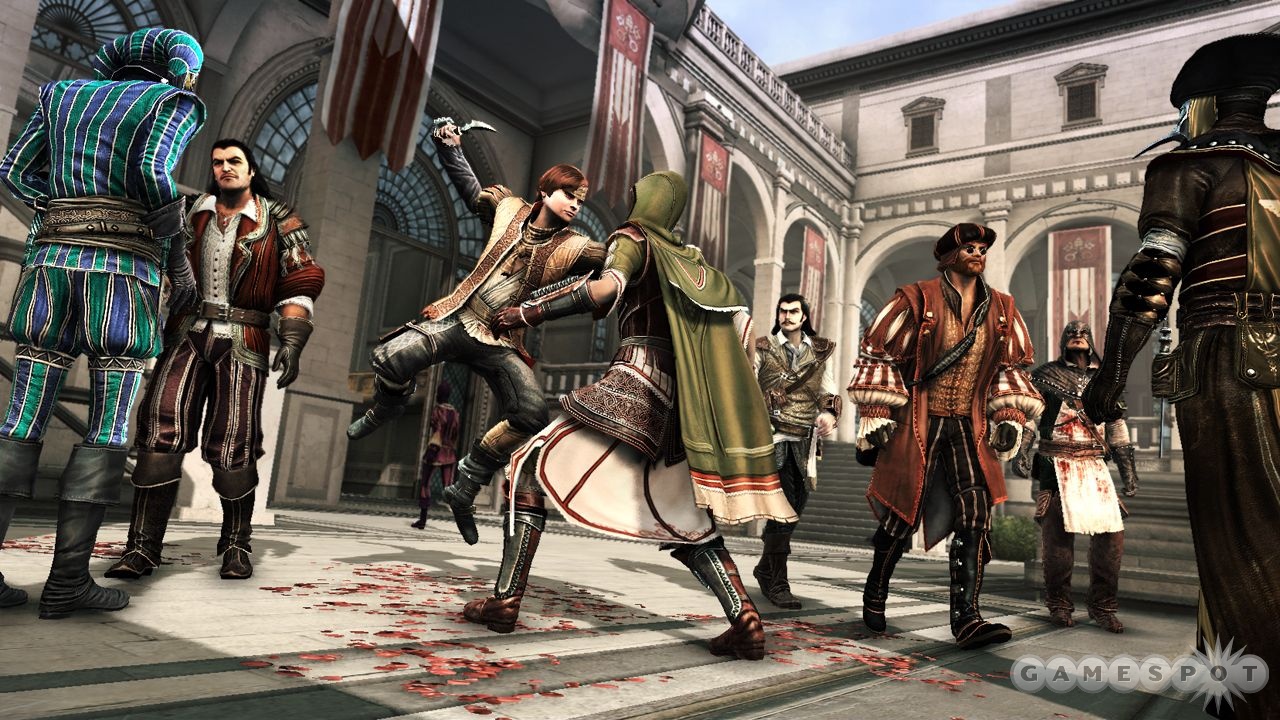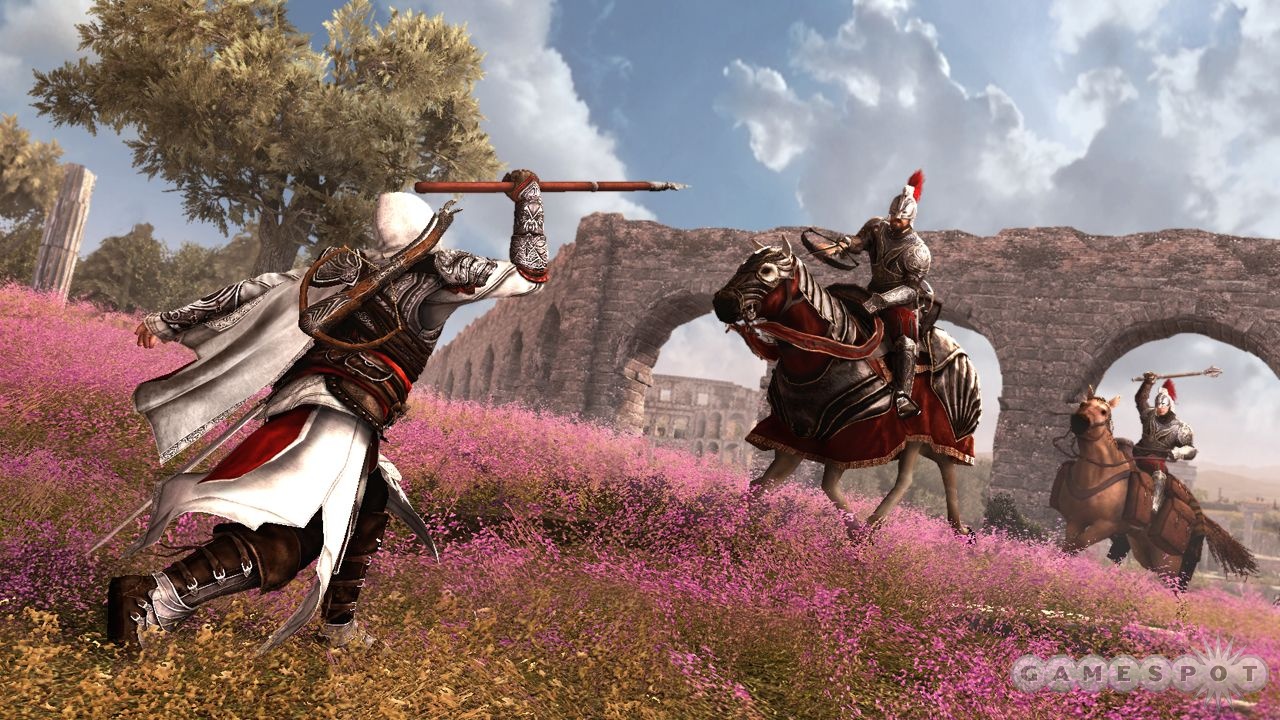Sound Byte: Meet the Composer - Assassin's Creed's Jesper Kyd
See how composer Jesper Kyd got his start in the business, and download an exclusive remixed track from the latest Assassin's Creed: Brotherhood soundtrack!
 Jesper Kyd is no stranger to the video game music scene and has been working in games for a long time. His most recent album is the soundtrack to Assassin's Creed: Brotherhood, which continues the story of the assassin Ezio and his struggle against the Templar Order. Before reading the interview below with the composer, I'd like to share an exclusive track called "
Jesper Kyd is no stranger to the video game music scene and has been working in games for a long time. His most recent album is the soundtrack to Assassin's Creed: Brotherhood, which continues the story of the assassin Ezio and his struggle against the Templar Order. Before reading the interview below with the composer, I'd like to share an exclusive track called "
Another Crab's Treasure Is A Soulslike 3D Platformer | GameSpot Review Stellar Blade Review Nintendo 64 – April 2024 Game Updates – Nintendo Switch Online Super Monkey Ball Banana Rumble - Official Multiplayer Features Trailer PUBG | Erangel Classic Returns Gori: Cuddly Carnage | Meow Launch Date Announcement Trailer Genshin Impact - "Arlecchino: Afterglow of Calamity" | Collected Miscellany Marvel Rivals - Official Loki Character Reveal Trailer | The King of Yggsgard Fortnite Festival - Official Billie Eilish Cinematic Season 3 Trailer Remnant 2 - The Forgotten Kingdom | DLC Launch Trailer Stellar Blade - Official "The Journey: Part 2" Behind The Scenes Trailer | PS5 Games Dead by Daylight | Tome 19: Splendor | Reveal Trailer
Please enter your date of birth to view this video
By clicking 'enter', you agree to GameSpot's
Terms of Use and Privacy Policy
GameSpot: What is your musical background?
Jesper Kyd: I grew up in the European demo scene, which I joined when I was 13. Prior to that I had been studying classical guitar, choir singing, and been playing the piano since I can remember.
GS: What was the first instrument that you picked up?
JK:That would be the piano since there was always one around no matter where I was. Every one of my uncles, aunts, grandparents--they all had a piano, and when vacationing for weeks in a small town with nothing to do, I would find myself sitting at a piano playing away.
GS: Is there an instrument you wish you knew how to play?
JK: Well, I like abusing instruments and playing them in ways they were not meant to be played. That includes tuning instruments in odd ways, etc. I think if I knew how to play these instruments I would be using them in very different ways. So I am quite happy to have a large collection of instruments I have no idea how to play but play anyway. As a kid I tried to take lessons for bagpipe playing. There were no such classes available, probably for the better--not sure when that kind of skill would come in handy. Then I wanted to play the saxophone but finally decided to take piano lessons with a focus on classical composition.
GS: What is your fondest memory when it comes to music?
JK: Sitting in front of the Commodore C64 listening to these amazing 10-minute tunes that would play on the main title screen of early games. I would just listen to these tunes all day. I don't know if I have a specific highlight--music was always a big part of my life.
GS: How did you get into making music for video games?
JK: Well, the European demo scene was a great place to start. Around this time I also created a lot of music on hardware synths with a friend of mine, and once I started to get associated with a lot of big demo scene productions I scored, we started to tour the biggest demo parties/hacker conferences. It was a great time. I remember dropping the keyboard in front of 3,000 people on our big debut night--right in the middle of the big keyboard solo with the spotlight and everything focused on that moment. Good times.
So after all my years in the demo scene, by the time I was 19 I became a professional composer and part owner of a game company called Zyrinx. We developed games such as Subterrania for Sega, Red Zone for Time Warner, and I also scored a bunch of other Sega Genesis/Megadrive titles such as The Adventures of Batman and Robin. That's how it all started really. And when most video game music started becoming CD music with the release of Sega CD, Sega Saturn, and the first PlayStation, I had already been making a ton of CD-based music with synths, so I was able to make the transition from C64, Amiga, and Sega Genesis "chip" music into CD-based music easily. My CD-based music sounded very different from my chip music, just as my film music sounds different from my music for video games.
GS: What other artists in the game music industry do you admire and why?
JK: I was really impressed by the whole atmosphere created for BioShock, including the sound design and music treatment. Garry is a good friend of mine, and I think he did a great job on the score.
GS: What kind of music do you listen to now?
JK: I love bands such as Royksopp and also find The Field very interesting. I have always been into Scandinavian music. Growing up in Scandinavia is hard to explain. In Denmark it's quite gray, and the winters get dark. I just came back from 2 weeks in Denmark and it rained every day I was there. It doesn't bother me, and the gray kind of atmosphere is something that is deeply rooted. To me there is more drama in a gray landscape than a landscape with sun from a cloudless sky.
GS: What are your biggest influences?
JK: I am inspired by cutting-edge artists and what's happening in the music scene. Not the Top 20 kind of pop music, but more analog-gear-based music which is being embraced by the music industry again. I have a lot of retro analog gear which I mix together with whatever music I am writing. For the Assassin's Creed franchise I have mixed this kind of technology with the orchestra and choir. I also use modern plug-ins, but I am very careful about how I use them. I try to create my own sound, and that's where the analog equipment helps a lot instead of using the same plug-ins a lot of people are using.
GS: How has the Assassin's Creed soundtrack evolved over time?
JK: The first score was about creating a mythical sound mixed with ancient Middle-Eastern elements. That developed into a mythical score with romantic and operatic influences for Assassin's Creed II. For Brotherhood, I turned to instruments that were around during the Renaissance and crafted a more intense and "deadly" sound based on the idea that Ezio was now a Master Assassin. Another development is that the last two games are based around Ezio, and so the music is more character-driven. Finally, I have been increasingly using more live instruments in the scores, and Brotherhood is now pretty much all live, even the smallest elements. I then take these live elements and craft something different with computers and analog gear. For example, we recorded in a large traditional church in Los Angeles which had no sound equipment whatsoever. So we hooked it up with microphones and got a massive sound from the instruments we recorded there. We also have big Renaissance flags swinging in synchronization, and this creates a massive sound in the church. These flags can be heard in the track called "Flags of Rome." Another cool session was the choir, which was an ultra-bass-focused session; that means the choir sings very deep bass tones. It was a challenge to find enough singers that could sing that kind of bass tone.
GS: How do you go about creating a tune that is representative of the era while still sounding modern?
JK: First of all, the compositions are not period music, except in a few instances. Then I use mostly traditional instruments which were around in the 15th century. Finally, I tweak, filter, and run things through a lot of analog gear to make certain instruments sound modern.
GS: How do you keep the music from taking over the gameplay but still be effective when listening to it on its own?
JK: The important thing is crafting something really unique that fits perfectly into the gameworld. When this is achieved, having music you actually notice is not going to take away from the gameplay--it's going to complement and enhance the atmosphere.
GS: What were some of your biggest challenges while working on the Assassin's Creed franchise?
JK: We wanted to continue the romantic operatic style of Assassin's Creed II. However, Brotherhood is a much darker game. It was a challenge to find a way to create a really dark operatic music style.
GS: Do you have a favorite track? Why?
JK: "Borgia Occupation" is one of my favorites. I have always wanted the opportunity to write a really dark and suspenseful vocal track. This one starts out with soft whispering Latin vocals and builds into a really intense piece. "City of Rome" was a blast to write, and I like how the synthesizers sound very organic. It's always a challenge putting analog synth next to a live performance and having that work out. Often the analog synths take over and the track becomes too focused on the synths. "Apple Chamber" is also an interesting mood, and I have a lot of synths going on that one.
GS: What is your process when working on a particular track?
JK: The process changes depending on what the track is for. If it's a main theme, I review and test the piece to make sure it can be played in different ways. When scoring to picture, the focus turns to making sure the music enhances the scene as much as possible. I often start with a simple idea and then build an arrangement around that. If it's an orchestral track I often play out the whole progression. In general I really like to get my hands dirty and play the instruments.
GS: What projects are you currently working on?
JK: I am working on a film and a game project. However, these have not been announced yet, so I can't talk about them. Another project of mine was just aired on SyFy Channel called the Resistance series. It's currently available on iTunes, Xbox Live, and PlayStation Network. Sam Raimi's Ghost House Pictures and Starz were involved with the production www.theresistanceseries.com.
GS: Do you have any tips for aspiring musicians?
JK: I think it's important to find a way to keep writing and improving the music. The bar is set very high for music quality in games, and the best way to practice and improve is to find a project to work on. Get involved with the mod community or try to hook up with a local developer.
GS: Thank you for your time!
Sound Byte is GameSpot's game music blog, which covers every aspect of music in games, including interviews with top game music composers and discussions of new and classic game soundtracks. Have a question or suggestion? Leave us a comment below. For a list of previous Sound Byte features, click here.
Got a news tip or want to contact us directly? Email news@gamespot.com


Join the conversation